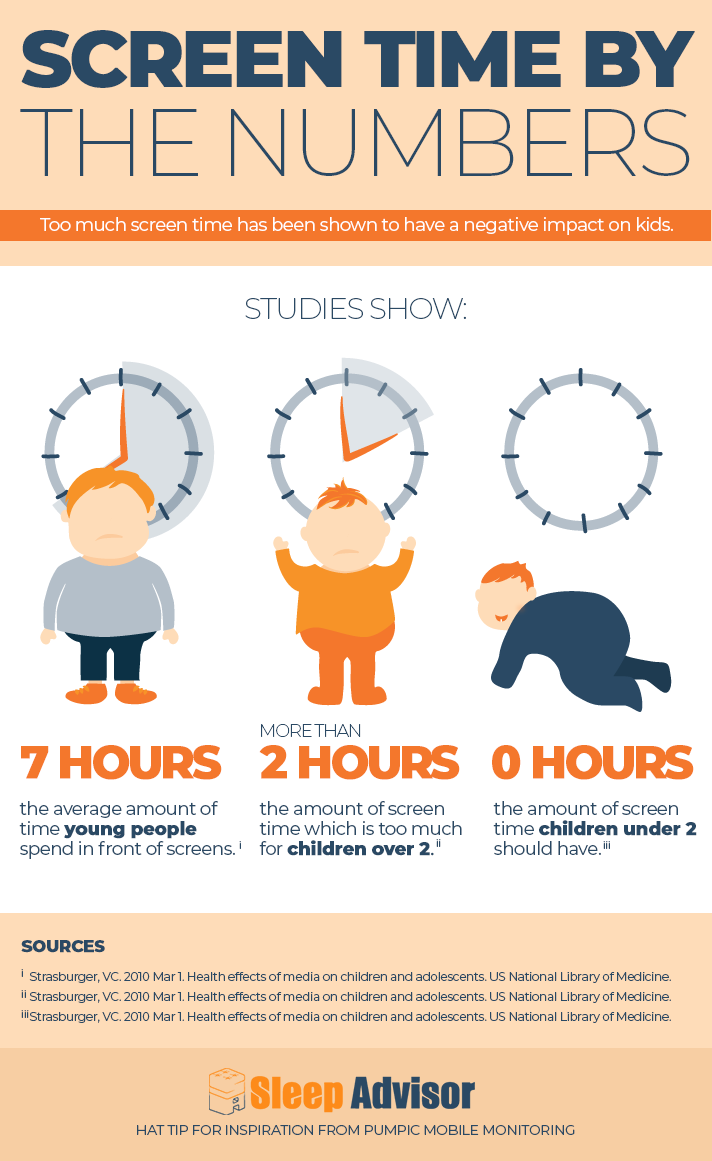You may have heard by now to avoid screen time before bed, including TV use, but why is watching TV before bed so detrimental to our sleep?
The truth is, there are several ways watching TV at night can disrupt our sleep, including the content that we watch, when we watch it, and how long we’re watching TV for. This is especially the case for kids and teens, many of whom may love binge-watching their favorite TV shows and movies before bed.
Keep reading for details on how the connection between TV and sleep influences our sleep habits, and what research and experts have to say about bedtime TV use.
TV Before Bedtime: A Tradition
Nearly a century ago, families could likely be found seated around a large radio, listening to the evening programs before bed. As technology advanced, families continued to gather together after dinner, only instead of listening to the radio, they could be found huddled together on the sofa, watching The Ed Sullivan Show or Howdy Doody on a 14-inch black and white screen.
Generations later, many parents and children still gather together in the evenings to watch a favorite program after their meal. Whether it is Nick-at-Nite or the evening news, people spend up to 50 percent of pre-bedtime watching television, according to an American Time Use Survey1.
Get More Info: Sleeping With Television On
Watching TV Before Bed: The Science
I watched TV before bed growing up and I turned out fine, so what’s the problem? It’s only for a few minutes, how bad could it be? How much is too much? If you’ve wrestled with these questions, you’re not alone.
For years, parents and the medical community alike have debated the amount of television kids should be watching, especially before bedtime. The World Health Organization’s (WHO) latest guidelines2 on physical activity, sleep, and sedentary behavior for children under the age of 5 states that “Sedentary screen time should be no more than 1 hour; less is better.”
Additionally, experts with the Mayo Clinic advise cutting off screen time an hour before bed3.
But why are pediatricians and sleep scientists so concerned about limiting screen time in children and what’s the big deal with letting kids watch a little TV before bed?
Delayed Sleep Cycle
TVs, like smartphones and computers, emit blue light4, a part of the light spectrum that stimulates the brain. Blue light can also suppress melatonin, a hormone released by our body to help us fall asleep at night.When melatonin production is delayed, our body’s internal clock is essentially thrown off track — meaning it will be more difficult or take that much longer to fall asleep.4
Ongoing research finds that children, in particular, who watch more TV and had TVs in their bedrooms experience significantly shorter sleep duration and worsened sleep, often compensating by napping in the daytime. The same data also showed that children who watched TV at night and gravitated towards TV programs geared to adults had an even greater negative impact on their sleep.4
Learn More: Delayed Sleep Phase Syndrome Explained
Anxiety-Inducing
Sleep coach and sleep expert Chelsey Borson, who works with children, says the type of content watched before bed can play a significant role in sleep. This includes particularly violent, frightening, or emotional content.
“TV content can induce anxiety, especially if the content is unsettling or viewed right before sleep,” Borson explains, “which leaves little time for children to unwind.”
While research on this topic5 is conflicting, and a clear link between excessive TV use and an increase in anxiety hasn’t been established, one thing we do know is the role anxiety can play in falling and staying asleep.
Anxiety releases stress hormones6. When these hormones are released close to bedtime, it can make it tough to relax in order to fall asleep. Chronic sleep loss can also cause anxiety, potentially creating a vicious cycle where worrying about being able to fall asleep can cause another sleepless night.
Therefore, it’s a smart idea to steer clear of anxiety-inducing TV content before bed, even though the connection is still being researched.
Nightmares
Similarly, particularly violent or scary TV content can cause nightmares in kids and adults alike. “Exposure to intense or exciting media content can trigger nightmares as the brain processes the day’s visual stimuli during sleep,” Borson explains.
In simpler terms, this means that what you see during the day can replay itself at night in the form of dream content, or in this case, nightmare content.
For kids, in particular, research has found that having a TV in the bedroom (which can lead to nighttime TV viewing) causes higher instances7 of sleep terrors, nightmares, and sleep talking.
If you’re concerned about the effect that nightttime TV use has on nightmares, you may want to avoid any scary or violent programs in the evenings, or consider removing their bedroom TV and opting for TV use in another room that isn’t associated with sleep, such as a living room or family room.
Learn More: How to Ease Nightmare in Toddlers
Effects of TV on Different Ages
Just as different screen time recommendations have been given for children based on their ages, the impact of television viewing before bed can vary by age group too.

Toddler: TV Before Bed
A study looking at screen time in toddlers aged 24 months and younger found that for every hour of screen time, total sleep time was reduced by almost 30 minutes8.
Another study involving over 450 preschoolers found that those who watched less than one hour of TV per day got 22 more minutes of sleep at night, totaling 2.5 hours more hours per week, than those who watched more than one hour daily.4
School-Aged Children: TV Before Bed
Similar to the studies done on preschoolers, research has found a direct correlation9 between the length of time spent watching television and decreased sleep duration in school-aged children. In addition, they found a connection between animated violence and impulsive agressive behavior in kids under eight years old. Experts say the reason for this could be that “they may be unable to distinguish between real life and fantasy.”9
Teenagers: TV Before Bed
Today’s media-savvy teenagers ages 13 to 18 consume a shocking eight-and-a-half hours10 of screen media per day, according to a 2021 study by Common Sense Media. So, what does this mean for teenage sleep habits?
“In teens, particularly those who binge-watch TV late into the night, the risks include delayed sleep cycles and significant disruptions to their overall sleep architecture,” Borson says. “This can lead to sleep deprivation, which can affect academic performance and emotional stability.”
Emerging research11 shows that more than six hours of screen use per day (including TV use) was associated with shorter sleep duration in 15-year-olds, and those who totaled more than nine hours of screen time daily experienced poor sleep quality as well.
Learn More: Beds for Teenagers
Alternative Bedtime Habits
If you’re concerned about your children watching television before bed, there are lots of great alternatives to TV. While you may face some opposition if your kids have become accustomed to TV time in the evening, gradually reducing the amount of time and spinning the change in a positive light may help to ease some of their dissent.

8 Bedtime Habits Instead of TV
- 1. Reading – Reading before bed can be relaxing, spark the imagination, and be an excellent bonding activity between parents and children.
- 2. Games – Playing board games or cards together can be a fun alternative to watching television as a family. Monopoly anyone?
- 3. Watching TV earlier – In today’s age, favorite shows can be watched anytime, regardless of when they aired. Instead of an hour of TV before bed, try two 30-minute segments earlier in the day.
- 4. Choose different programming – If you do decide to allow kids to watch a movie or show before bed, be sure to avoid anything with violence or disturbing themes to prevent anxiety and nightmares.
- 5. Audiobooks – If you can’t spend time reading with your kids, consider allowing them to listen to audiobooks so they can still get the benefits of imaginative stories without any exposure to blue light.
- 6. Listening to music – Music can be very relaxing for falling asleep. Another option along these lines would be calming nature sounds such as rainfall or ocean waves.
- 7. Practice yoga – More and more individuals are benefitting from the relaxing effects of yoga on sleep. There are many great kid-friendly resources to teach children about yoga poses in a fun and engaging way.
- 8. Journal – Journaling can help to clear the mind before bed. Starting this practice while children are still young can help instill healthy pre-bedtime habits they may continue into adulthood.
Final Word of Advice
While the jury is still out on just how detrimental watching TV before bed is for kids, we do know that it could impact the overall amount of rest kids are getting and cause anxiety or nightmares depending on what they are watching.
Sleep is extremely important for learning, memory, health, emotional regulation, and so much more. As a parent, I’m concerned enough by the research to set some new rules about watching television before bedtime in my household. While we may still enjoy the occasional movie night cuddled together on the couch, our bedtime routine will look a lot more like books, bath, and bed!

Raina Cordell
RN, RHN, Certified Health Coach
About Author
Raina Cordell is a Registered Nurse, Registered Holistic Nutritionist, and Certified Health Coach, but her true passion in life is helping others live well through her website, www.holfamily.com. Her holistic approach focuses on the whole person, honing the physical body and spiritual and emotional well-being.
References:
- “Television Watching Before Bedtime Can Lead To Sleep Debt”. American Academy of Sleep Medicine. 2019.
- “GUIDELINES ON PHYSICAL ACTIVITY, SEDENTARY BEHAVIOUR AND SLEEP FOR CHILDREN UNDER 5 YEARS OF AGE”. World Health Organization. 2019.
- “Screen time and children: How to guide your child”. Mayo Clinic. Last modified February 10, 2022.
- Helm, Abigail F., Spencer PhD, Rebecca M. C. “Television use and its effects on sleep in early childhood. Sleep Health. 2019.
- McAnally, Helena M., Young, Tamara., Hancox, Robert J. “Childhood and adolescent television viewing and internalising disorders in adulthood”. Preventative Medicine Reports. 2019.
- “Sleep anxiety”. Cleveland Clinic. Last modified April 12, 2024.
- Brockmann, Pablo, et al. “Impact of television on the quality of sleep in preschool children”. Sleep Medicine. 2016.
- Chen, Bozhi., et al. “Screen viewing behavior and sleep duration among children aged 2 and below”. BMC Public Health. 2019.
- Marinelli PhD, Marcella., et al. “Hours of Television Viewing and Sleep Duration in Children: A Multicenter Birth Cohort Study”. JAMA Pediatrics. 2014.
- “The Common Sense Sensus: Media use by tweens and teens”. Common Sense Media. 2021.
- Echevarria, Priscila., et al. “Screen use and sleep duration and quality at 15 years old: Cohort study”. Sleep Medicine: X. 2023.
